 CANONIZATION MASS
CANONIZATION MASS
FOR FIVE NEW SAINTS
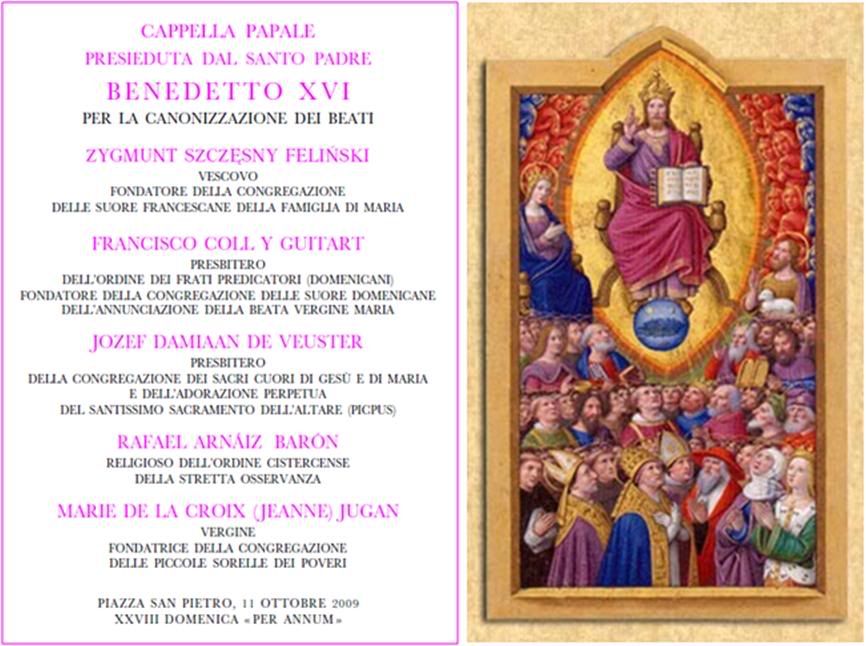 Tapestries on the facade of St. Peter depict, from left, Saints Rafael Arnaiz, Francisco Coll, Zygmunt Felinski, Daamien de Veuster, and Jeanne Jugan.
Tapestries on the facade of St. Peter depict, from left, Saints Rafael Arnaiz, Francisco Coll, Zygmunt Felinski, Daamien de Veuster, and Jeanne Jugan.
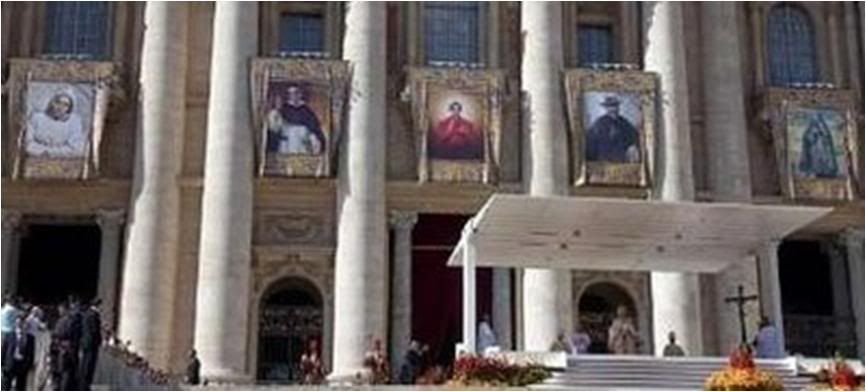
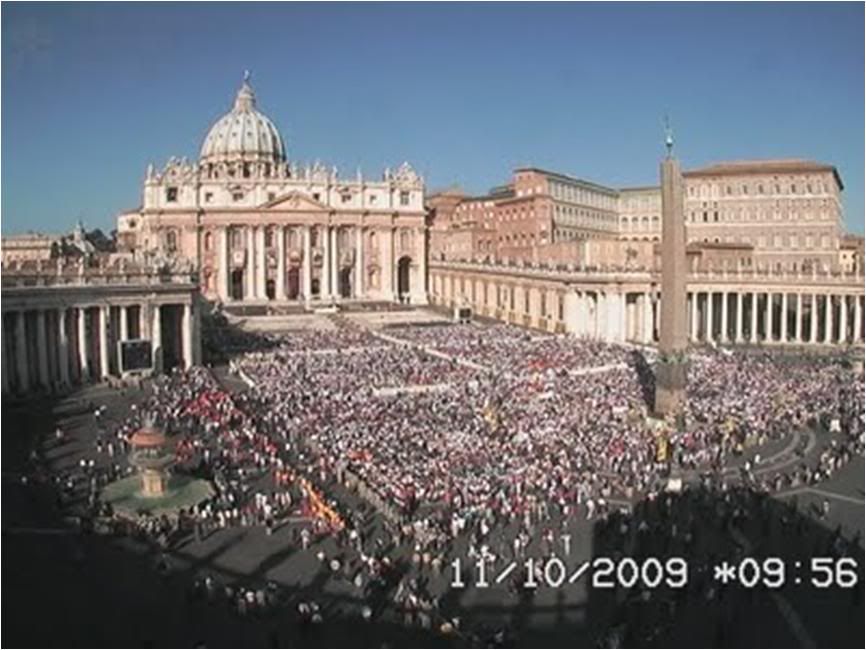 NB: The decision was made to hold the Mass inside the Basilica because Rome had a major thunderstorm with flooding yesterday afternoon,
NB: The decision was made to hold the Mass inside the Basilica because Rome had a major thunderstorm with flooding yesterday afternoon,
and even this morning, there were new thunderstorms around 6 a.m.
Pope proclaims 5 new saints

VATICAN CITY, Oct. 11 (AP) — Pope Benedict XVI canonized five new saints Sunday, including a 19th century priest who worked with leprosy patients on an isolated Hawaiian island, praising them as models of perfection for sacrificing themselves for others.
Among the pilgrims packing St. Peter’s Basilica was Hawaii resident Audrey Toguchi, an 80-year-old retired teacher whose recovery from lung cancer a decade ago was called miraculous by the Vatican.
She had prayed to Belgium-born Jozef De Veuster, more commonly known as Father Damien, who himself died from leprosy on Molokai island in 1889.
During the ceremony, which lasted more than two hours, Toguchi and her doctor, Walter Chang, joined a procession of faithful bringing relics of the new saints to Benedict at the central altar of the basilica.
The Pontiff said the newly canonized had taken up the call of Jesus to give themselves totally without "calculation or personal gain."
"Their perfection, in the logic of a faith that is humanly incomprehensible at times, consists in no longer placing themselves at the center, but choosing to go against the flow and live according to the Gospel," Benedict said in his homily.
Originally, the ceremony was set for St. Peter’s Square to accommodate the tens of thousands of pilgrims expected to participate and cheer on their local heroes.
The Vatican didn’t say why the Mass ended up being celebrated in the basilica, but occasional thunderstorms had drenched Rome over the past two days.
Among the other new saints are Zygmunt Szcezesny Felinski, a 19th century Polish bishop who defended the Catholic faith during the years of the Russian annexation, which had led to the shutdown of Polish churches. He was eventually deported to Russia.
Among those in the basilica was the former secretary of the late Pope John Paul II, Stanislaw Dziwisz, who is now cardinal of Krakow.
Two Spaniards were honored — Francisco Coll y Guitart, who founded an order of Dominicans in the 19th century, and Rafael Arniaz Baron, who renounced an affluent lifestyle at age 22 to live a humble life in a strict monastery and dedicate himself to prayer. Benedict hailed Brother Rafael, who died at 27 of a diabetic coma, as model for young people "who are not satisfied easily."
[And why did Their Catholic Majesties of Spain not come or at least send one of their children to represent the country, seeing that two of the new saints are Spaniards, though both from Catalonia?]
The fifth new saint was Jeanne Jugan, a Frenchwoman described by Vatican Radio as an "authentic Mother Teresa ahead of her time." As a nun, she went by the name Marie de la Croix and helped found the Little Sisters of the Poor, which today runs homes for the indigent elderly around the world. She died in 1879.
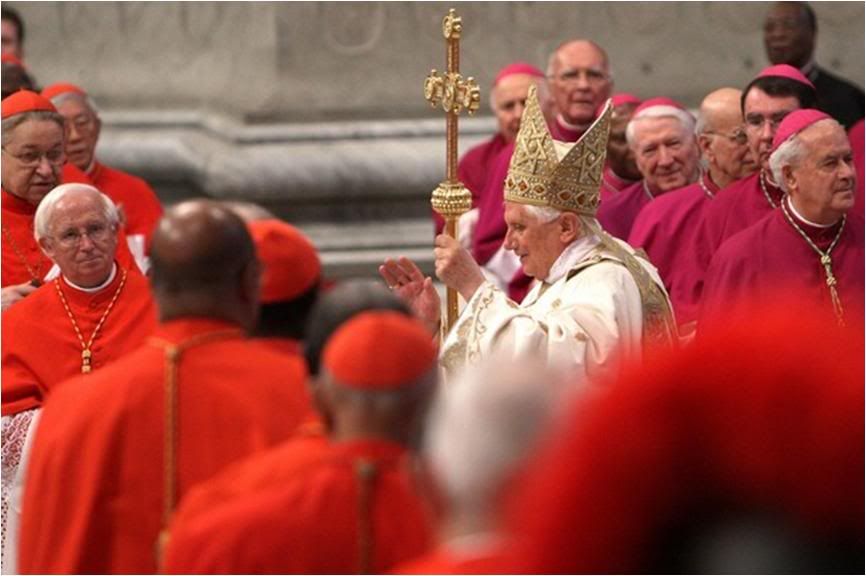
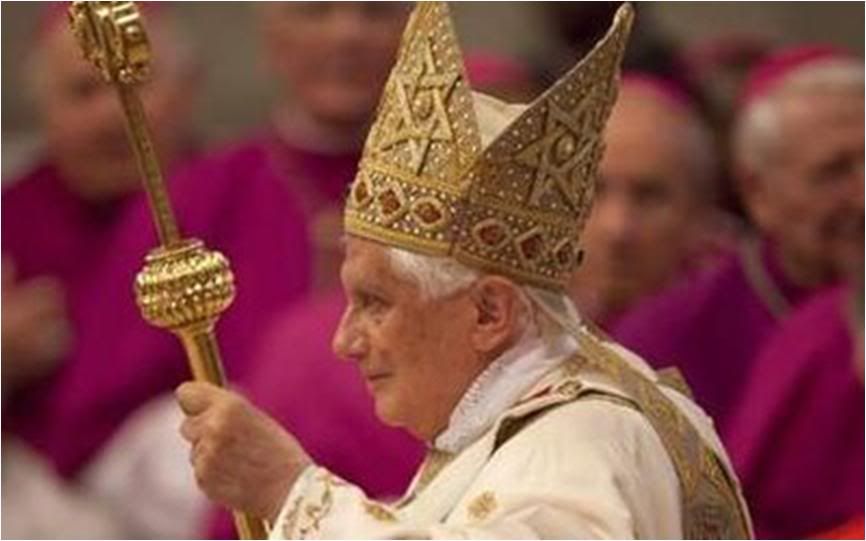 Interesting to see the six-pointed star as a prominent element in the papal miter's decoration!
Interesting to see the six-pointed star as a prominent element in the papal miter's decoration!
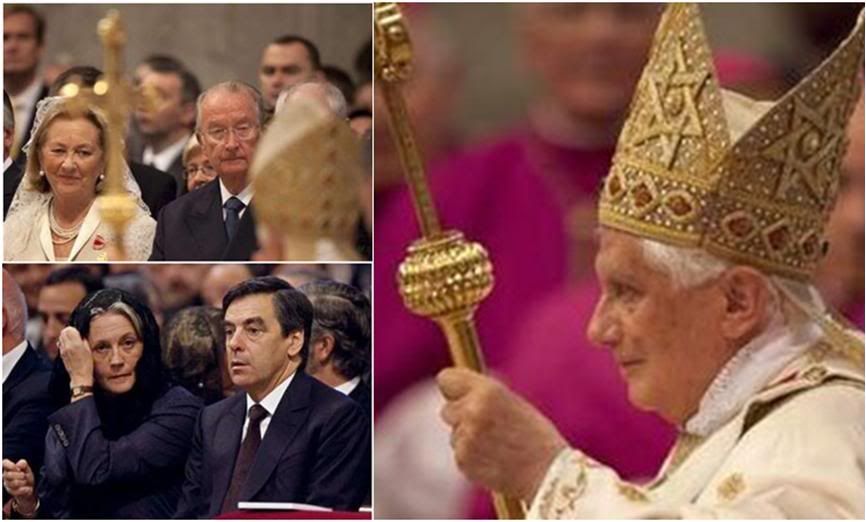
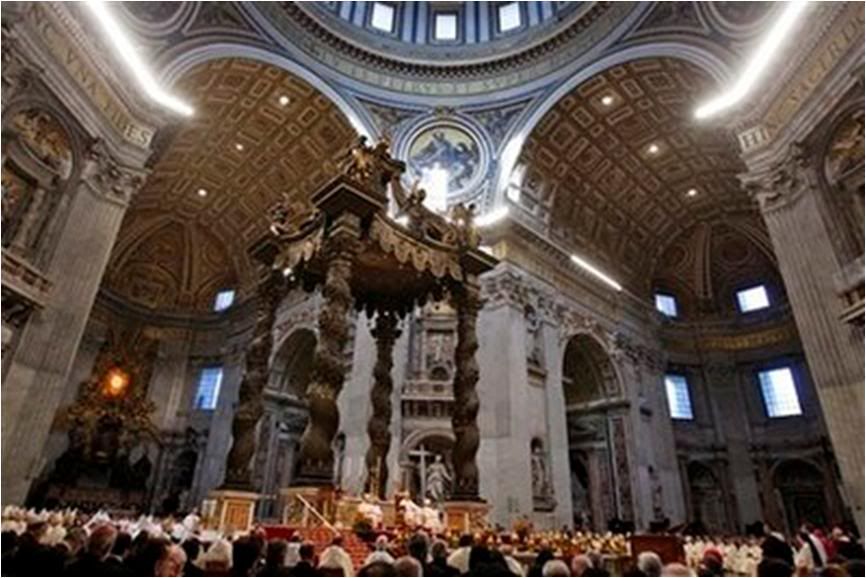
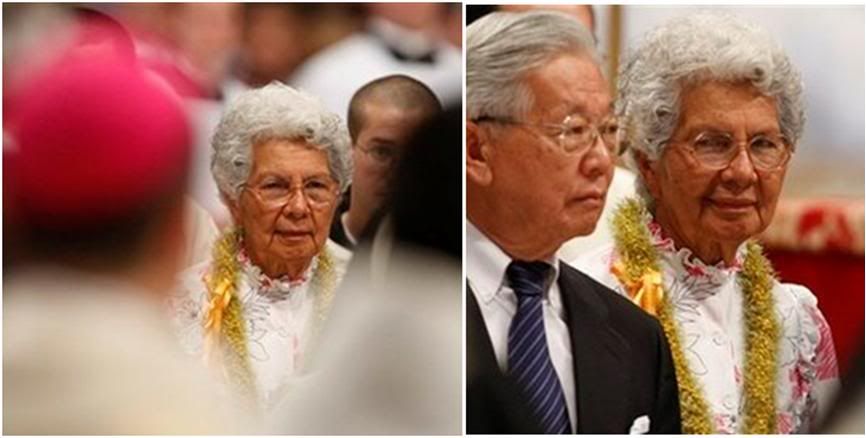 Above, Fr. Damien's second miracle, Audrey Toguchi, with her surgeon, Dr. Wesley Chang.
Above, Fr. Damien's second miracle, Audrey Toguchi, with her surgeon, Dr. Wesley Chang.
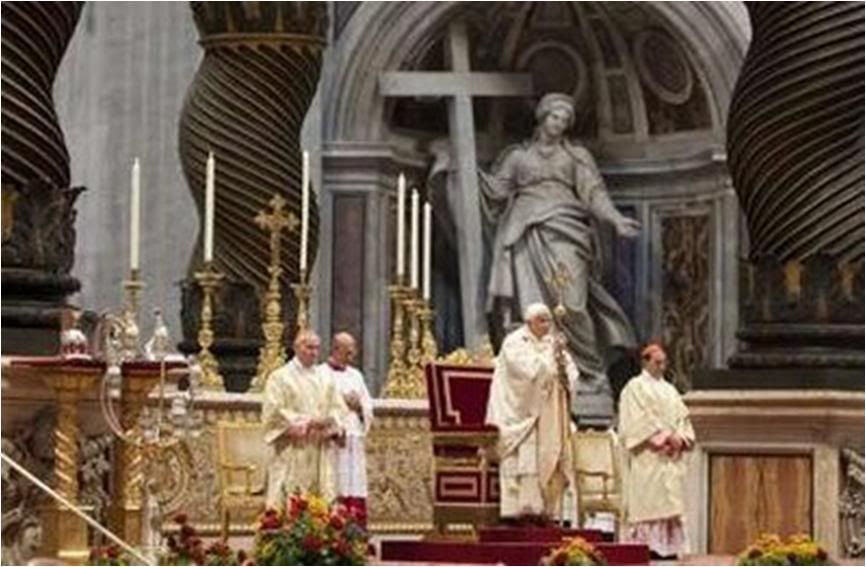
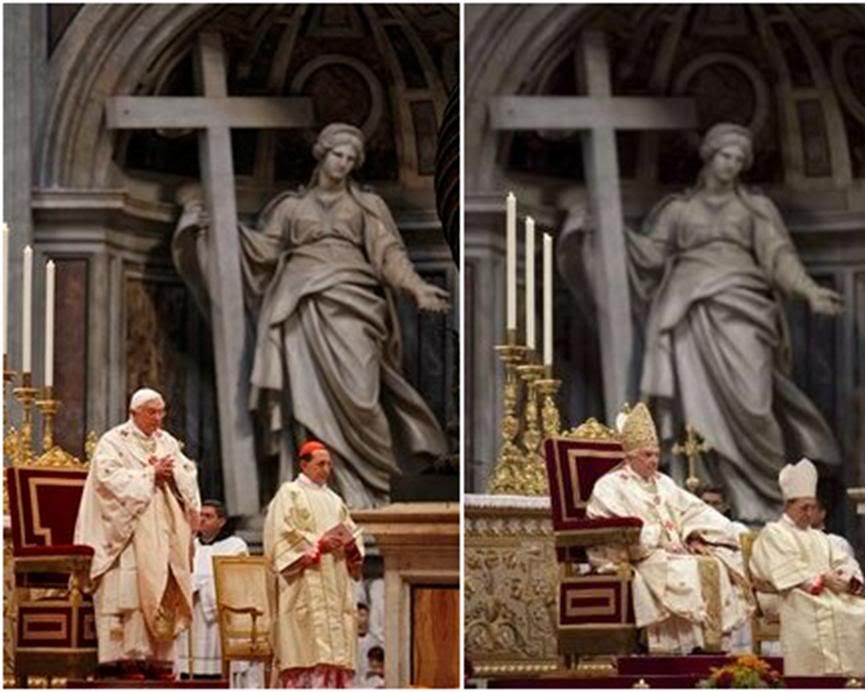
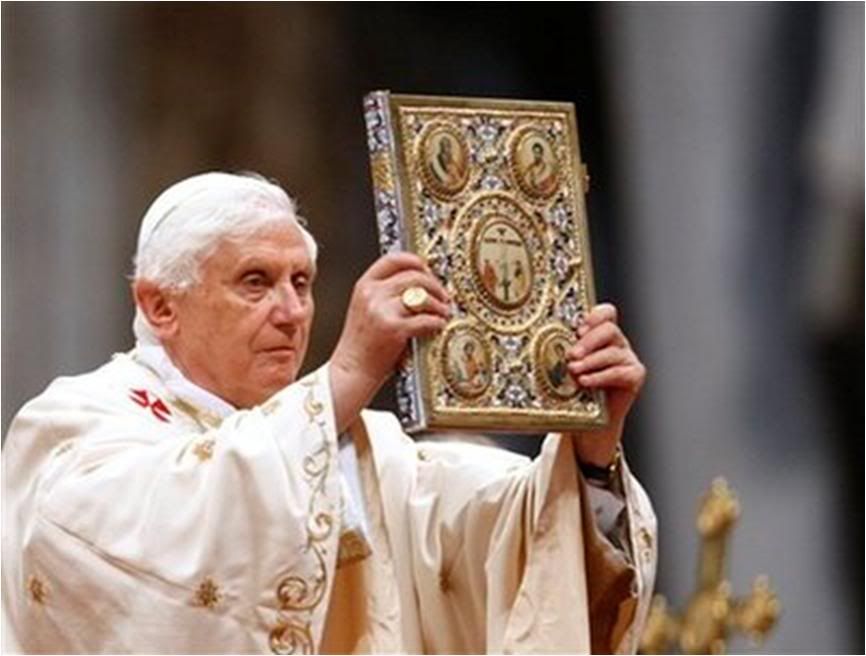
Here is a translation of the Holy Father's homily today:
THE POPE'S HOMILY
Dear brothers and sisters:
"What must I do to inherit eternal life?"
This question starts the brief dialog we heard in the Gospel reading today, between someone identified elsewhere only as a rich young man, and Jesus (cfr Mk 10, 17-30).
We don't have details about this anonymous person: but from the few we know, we can perceive his sincere desire to reach eternal life by leading an honest and virtuous earthly existence. In facT, he knows the commandments and had observed them faithfully from childhood.
But all this, which is certainly important, does not suffice, Jesus says. It lacks one thing, but one that is essential. Seeing the young man well disposed, the divine Teacher looks at him with love and proposes a leap in quality - he calls him to the heroism of holiness, he asks him to abandon everything to follow him: "Go, sell what you have, and give IT to (the) poor... then come, follow me" (v 21).
"Come follow me!" That is the Christian calling in an offer of love from the Lord and which can only be reallized with our own response of love.
Jesus invites his disciples to give their life totally, witbout human calculation or reckoning, but with unconditional trust in God. The saints accept this exigent invitation, and follow in the footsteps of the crucified and risen Christ with humble obedience.
Their perfection, in the logic of a faith that is sometimes humanly incomprehensible, consists in not placing themselves any longer in the center of things, but in choosing to go against the current by living according to the Gospel.
That is what the five saints did, whom today, with great joy, are offered for veneration by the universal Church: Zygmunt Szczęsny Feliński, Francisco Coll y Guitart, Jozef Damiaan de Veuster, Rafael Arnáiz Barón and Marie de la Croix (Jeanne) Jugan.
In them we can contemplate the realization of the words of the Apostle Peter: "We have given up everything and followed you" (v. 28) and Jesus's comforting assurance: "There is no one who has given up house or brothers or sisters or mother or father or children or lands for my sake and for the sake of the gospel who will not receive a hundred times more now in this present age... (along) with persecutions, and eternal life in the age to come." (v. 28-30).
He said the following in Polish translated here from the Vatican's Italian text):
Zygmunt Szczęsny Feliński, Archbishop of Warsaw, founder of the Congrgeation of Franciscan Sisters of the Family of Mary, was a great witness to faith and pastoral charity in times that were very difficult for the nation and for the Church in Poland.
He concerned himself zealously with the spiritual growth of the faithful, and helped widows and orphans. At the Ecclesiastic Academy of St. Petersburg, he took charge of providing solid formation for priests. As Archbishop of Warsaw, he isnpired everyone towards interior renewal.
Before the January 1863 insurrection against Russian annexation, he warned the people against futile bloodshed. But when the revolt erupted and was followed by repressions, he courageously defended the oppressed.
By order of the Russian czar, he spent the next twenty years in exile in Jaroslav on the Volga, without ever again being able to return to his diocese.
In every situation, his confidence in Divine Providence never wavered, and thus he prayed: "Oh God, protect us not from tribulations and the concerns of these world, but multiply the love in our hearts and grant that with the most profound humility, we may keep infinite trust in your help and your mercy".
Today, his self-giving to God and to his fellowmen, with total confidence and love, is a brilliant example for all the Church!
He said the following in Spanish:
St. Paul reminds in the seocnd Reading today that "the word of God is living and effective" (Heb 4,12). In his Word, the Father who is in heaven converses lovingly with his children through all time (cf Dei verbum, 21), making them feel his infinite love, and in this way, to encourage them, comfort them and offer them his plan of salvation for mankind and for each person.
Aware of this, St. Francisco Coll dedicated himself eagerly to propagate the Word, thus faithfully fulfilling his calling in the Order of Preachers [Dominicans], to which he belonged.
His passion was preaching, largely in an itinerant way and in the form of 'popular missions', aimed at anonouncing and reviving the Word of God in the towns and cities of his native Catalonia, thus helping the people to a profound encounter with him.
An encounter with God that would lead to a conversion of the heart, that it may receive divine grace with joy and maintain a constant dialog with our Lord through prayer.
That is why his evangelizing activity included great emphasis on the sacrament of Reconciliation leading to the Eucharist, and a constant insistence on prayer.
Francisco Coll reached the hearts of others because he himself lived with an interior passion what burned in his heart - love of Christ and his total deliverance to him.
In order that the Word of God would encounter good earth, Francisco founded the Congregation of the Dominican Sisters of the Annunication, for the purpose of giving an integral education to children and young people that would lead them to discover the unfathomable richness that is Christ, the faithful friend who never abandons us nor tires of being by our side, inspiring our hope with his Word of life.
He said the following in Flemish, translated here from the Vatican's Italian text:
Jozef De Veuster, who received the name Daamian in the Congregation of the Sacred Hearts of Jesus and Mary, left Flanders, his native land, in 1868 to announce the Gospel on the other side of the world - in the Hawaiian islands.
His missionary activity, which gave him great joy, reached its culmination in charity. Not without fear and repugnance, he chose to go to the island of Molokai in the service of the lepers found there, abandoned by everyone, thus exposing himself to the disease that they suffered from.
But with them, he felt at home. The servant of the Word thus became a suffering servant - a leper among lepers during the last four years of his life.
He said the following in German:
To follow Christ, Father Daamian not only left his country but also placed his own life at risk. That is why he - as Jesus says in the Gospel passage today - has received eternal life (cfr Mk 10,30).
He spoke next in French:
On this 20th anniversary of the canonization of another Belgian saint, Brother Mutien-Marie, the Church in Belgium is united once more in thanking God for one of her children who became known as an authentic servant of God.
Before this noble figure, we are reminded that charity makes for unity: it gives birth to unity and makes it desirable.
In the footsteps of St. Paul, St. Daamien enlists us to choose the good fights (cf 1 Tim 1,18) - not those that bring division, but those which unite. He invites us to open our eyes to the leprosies that disfigure the humanity of our brothers and calls on us even today for the charity of our serving presence, much more than our generosity.
Next, he spoke in Spanish:
In contrast to the young man who presents Jesus with his desire to be something more than just a good follower of the duties that the commandments impose, as we heard in today's Gospel, is brother Rafael, whom we canonized today, and who died at age 27 as an Oblate in the Trappist monastery of San Isidro de Duenas.
He too was from a well-off family, and as he himself said, "with a rather dreamy spirit", but whose dreams did not consist in attachment to material things and other goals that the world offers, often with great insistence.
He said Yes to the prospect of following Jesus, immediately and decisively, without limits or conditions. Thus he started a journey which - from the moment at the mOnastery WHEN he realized "he did not know how to pray" - brought him in a few years to the peak of spiritual life, which he relates with great plainness and naturalness in numerous writings.
Brother Rafael, who is still close to us, continues to offer us through his example and his works an attractive trajectory, especially for those young people who conform to little but aspire to the full truth, towards the most indescribable joy which one can reach through love of God.
"A life of love - that is the only reason to live", the new saint wrote. He insists: "Everything comes from God's love".
May the Lord listen kindly to one of the last prayers of St. Rafael Arnaiz when he offered all his life to him, pleading: "Take me, and give me to the world". He gave himself in order to renew the interior life of Christians today. He gave himself so that the Trappist brothers and the monastic centers may continue to be beacons that allow us to discover that intimate yearning for God that he has placed in every human heart.
In French:
For her admirable work of service to the neediest of aged persons, St. Marie de la Croix is also like a beacon to guide our societies which always have to rediscover the place and the unique contribution of the stage of life that old age is.
Born in 1783 in Cancale, Brittany, Jeanne Jugan cared about the dignity of her brothers and sisters in humanity whom age had made vulnerable, recognizing in them the person of Christ himself.
"Look at the poor with compassion," she said, "and Jesus will look at you kindly on your last day". Jeanne Jugan carried out her compassion for aged persons, which she pursued in her profound communion with God, through joyous disinterested service which she did with tenderness and humble heart, wanting to be poor among the poor herself.
Jeanne lived the mystery of love. serenely accepting obscurity and asceticism until she died. Her charism remains very actual since so many older persons suffer from multiple poverties and loneliness, sometimes even abandoned by their own families.
Jeanne found the source of this spirit of hospitality and fraternal love, based on unlimited trust in Providence which illuminated her whole life, in the Beatitudes.
That evangelical zeal is pursued today throughout the world by the Congregation of the Litte Sisters of the Poor, which she founded and which has borne witness since them to the mercy of God and the compassiobate love of the Heart of Jesus for the least of men.
May St. Jeanne Jugan be for older persons a living source of hope, and for those who place themselves generously in their service, a powerful stimulus to follow and develop her work.
He concluded in Italian:
Dear brothers and sisters, let us thank the Lord for the gift of holiness, which shines in the Church today with singular beauty.
As I greet each of you with affection - cardinals, bishops, civilian and military authorities, priests and religious, lay faithful of various nationalities taking part in this solemn Eucharistic celebration - I wish to ask everyone to let yourself be drawn by the luminous examples of these saints, let yourself be guided by their teachings so that all our existence may be a canticle of praise to the love of God.
May this grace be obtained for us by their celestial interecession, and above all, by the maternal protection of Mary, Queen of Saints and mother of mankind. Amen.
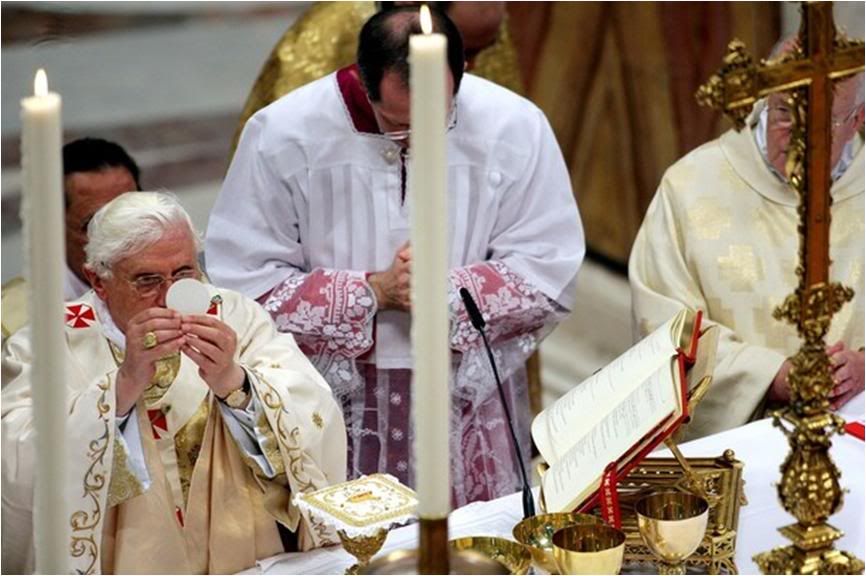
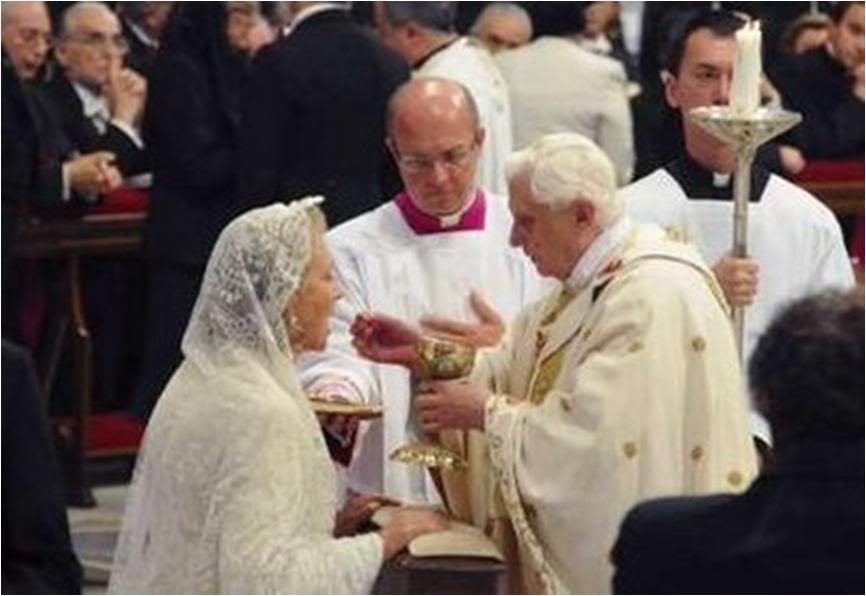
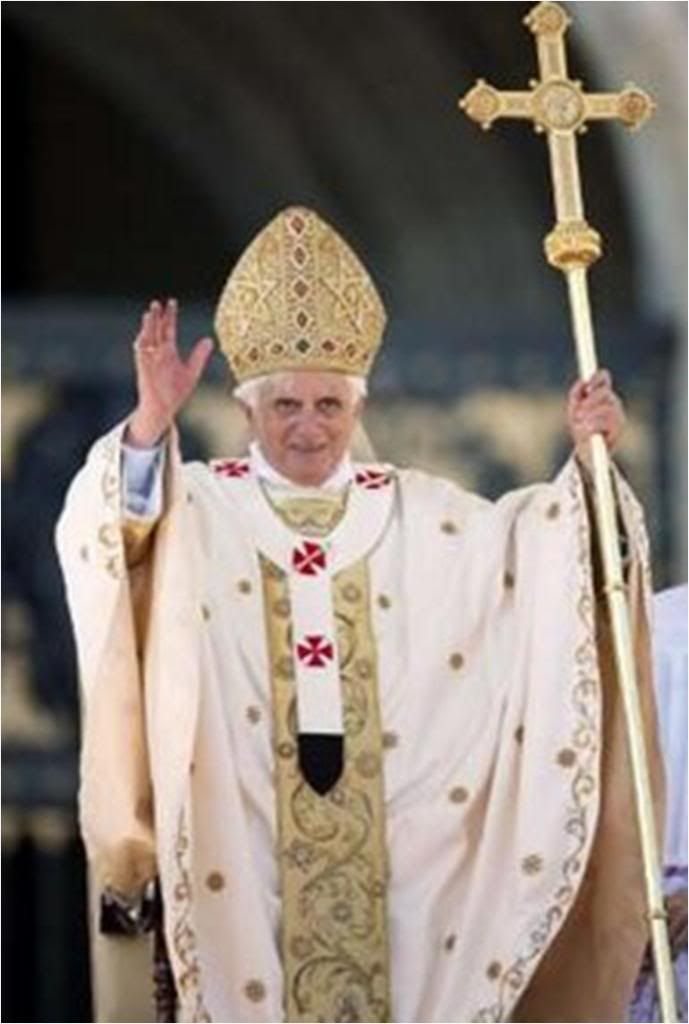
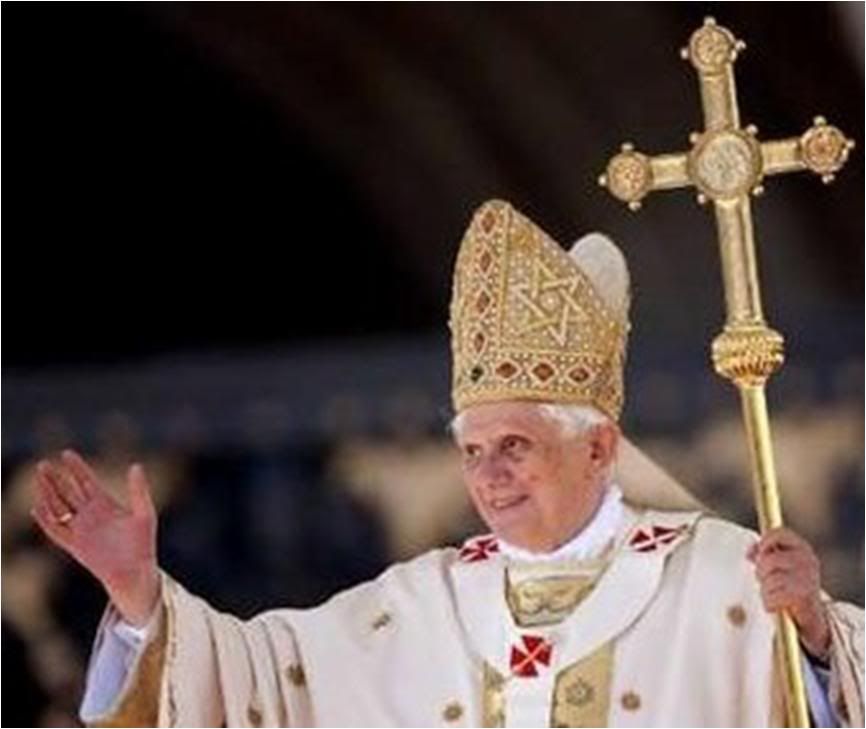
After the Mass today, the Holy Father met with the official heads of delegations from the countries of the new saints:
With Polish President Lech Kaczynski and his wife Maria
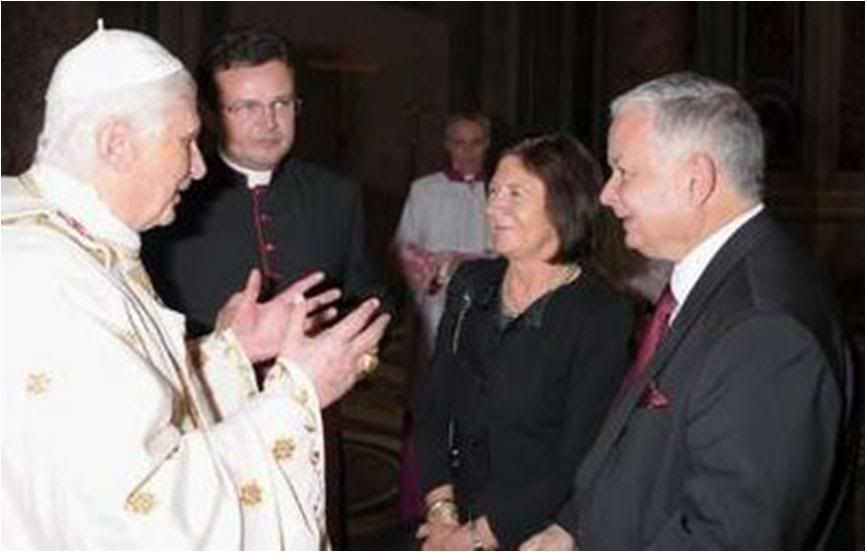
With the Foreign Minister of Spain, Miguel Angel Moratinos
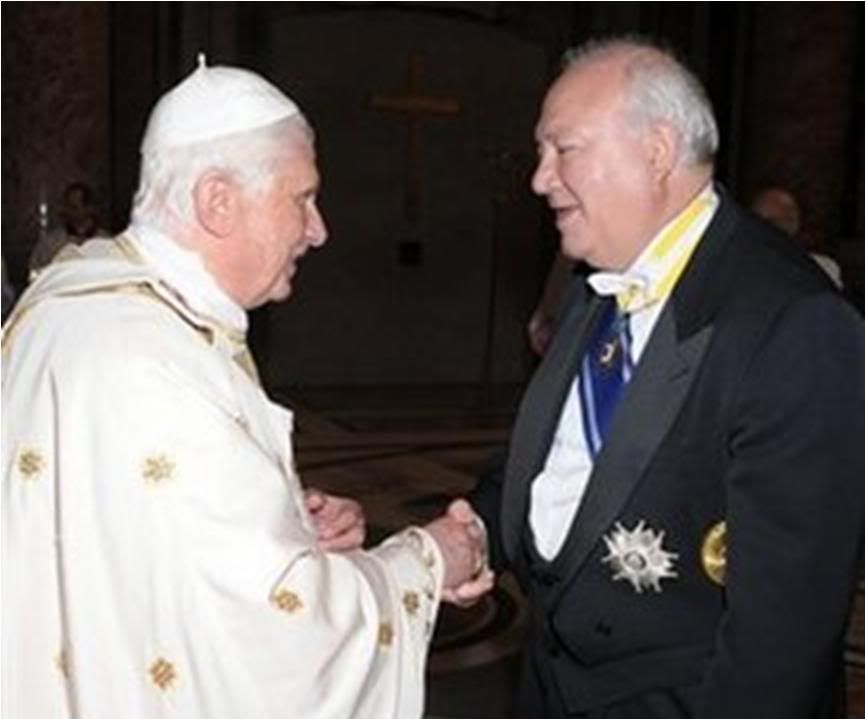
With King Albert I and Queen Paola of Belgium
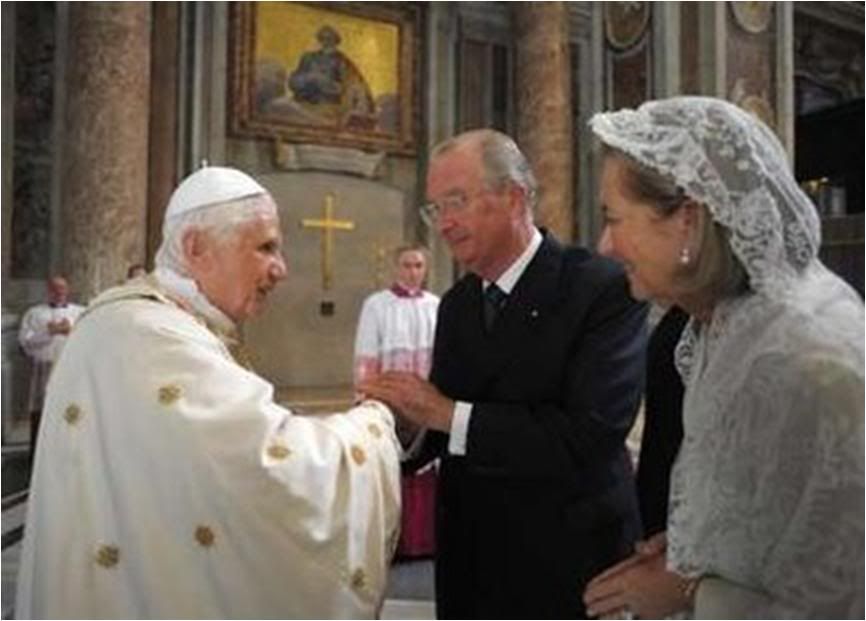
With Senator Daniel Akaka of Hawaii, presented by the new US Ambassador Miguel Diaz and his wife Marianne
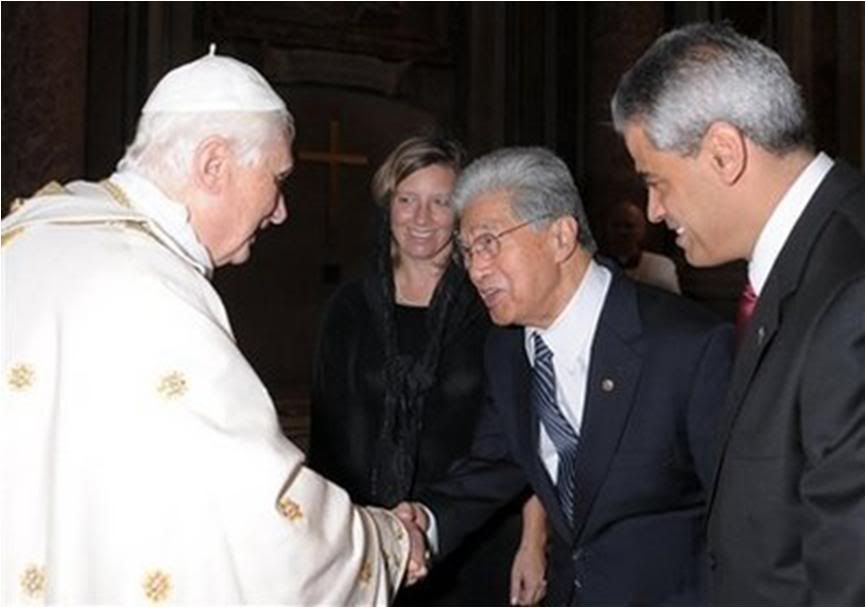
With French Prime Minister Francois Fillon and his wife Penelope
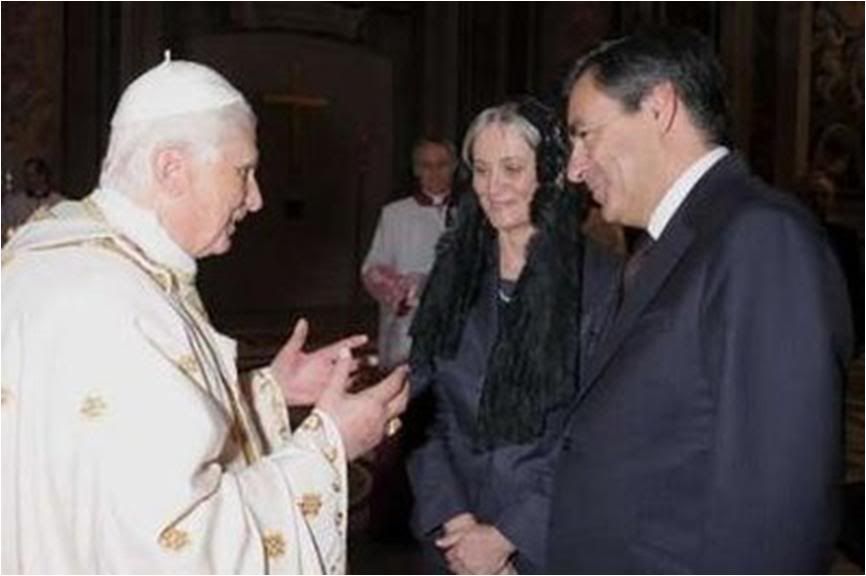 Pope discusses WYD-2011 with Spanish foreign minister,
Pope discusses WYD-2011 with Spanish foreign minister,
meets representatives of new saints' home countries

VATICAN CITY, OCT. 12, 2009 (Zenit.org).- Benedict XVI held a brief meeting on Sunday with Spain's Minister of Foreign Affairs to discuss preparations for the 2011 World Youth Day in Madrid.
Miguel Ángel Moratinos was in the Rome as the head of the official Spanish delegation that attended the canonization of the first two Spanish saints canonized by this Pope: Father Francisco Coll and Brother Rafael Arnáiz.
"Among the topics discussed was the preparation for World Youth Day, which will take place in Madrid in August of 2011, and the meaning of the canonizations for the Spanish Church and society," the Spanish Embassy to the Holy See reported.
The communiqué added that after the meeting with the Pontiff, the minister had a "lengthy conversation" with Archbishop Dominique Mamberti, the secretary for relations with states.
It added, "In an atmosphere of great cordiality, the interlocutors addressed among other topics: the priorities of the Spanish presidency of the European Union beginning in January of 2010, the Alliance of Civilizations, international issues of mutual interest and other points that affect Church-State relations."
The Holy Father also received the delegations from the native countries of the other newly canonized saints.
Attending on the Belgian side, in honor of St. Damien De Veuster, apostle of the lepers in Molokai, were King Albert II and Queen Paola of his homeland.
As Molokai is in Hawaii, the ambassador of the United States to the Holy See, Miguel Díaz, also attended the ceremony along with one of the state's senator,s Daniel Kahikina Akaka.
In honor of St. Zygmunt Szczesny Felinski of Poland, the president of the Republic, Lech Kaczynski, was present in the Vatican.
France, which was celebrating the newly canonized St. Jeanne Jugan, was represented by Prime Minister François Fillon.
[Modificato da TERESA BENEDETTA 13/10/2009 03:48]